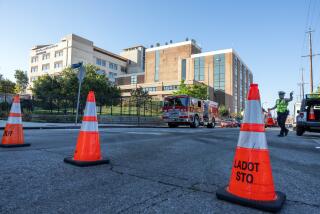Nurses at King Hospital Agree to Return to Work
- Share via
Nurses staging a wildcat sickout at Martin Luther King Jr./Drew Medical Center agreed to return to work today after hospital officials said they would relieve them of the responsibility of caring for overflow emergency room patients.
Ten of 17 nurses assigned to the county hospital’s busy emergency room had staged a sickout since Monday to protest working conditions.
Hospital spokeswoman Patricia Fullenweider said the nurses were expected to report as scheduled for all shifts today. The agreement was reached after six hours of negotiations between emergency room nurses and hospital administrators.
The nurses had protested that they were overburdened by the responsibility for overflow patients who were not suffering trauma, but were only in the emergency room while they waited for a bed to become available in the main hospital. The back-to-work agreement was accompanied by a plan to continue talks today on other outstanding issues.
Fullenweider said a general nursing shortage at the hospital led administrators several months ago to close two adult patient units totaling about 60 beds. That, she said, made it more difficult to move patients out of the emergency area and into rooms. Until the patients were moved, they remained under the care of emergency room nurses, in effect doubling their workload.
When the units were closed, the hospital implemented a policy relieving emergency room doctors of the responsibility for the waiting patients. This made the patients the responsibility of doctors on the medical and surgical floors to which the patients were assigned. The policy failed, however, to also shift the nursing responsibilities to nurses on those floors, Fullenweider said.
Aside from that issue, nurses also believe the emergency room is chronically understaffed, according to Craig Howard, who works the day shift. He said hospital staffing standards require Martin Luther King’s emergency room to have 14 registered nurses per shift. But it has only 17 nurses for all three shifts, he said.
“We want to give the best care that we can to our patients, but sometimes we just can’t give them the quality,” said Ethel Edmond, another registered nurse.
More to Read
Sign up for Essential California
The most important California stories and recommendations in your inbox every morning.
You may occasionally receive promotional content from the Los Angeles Times.










